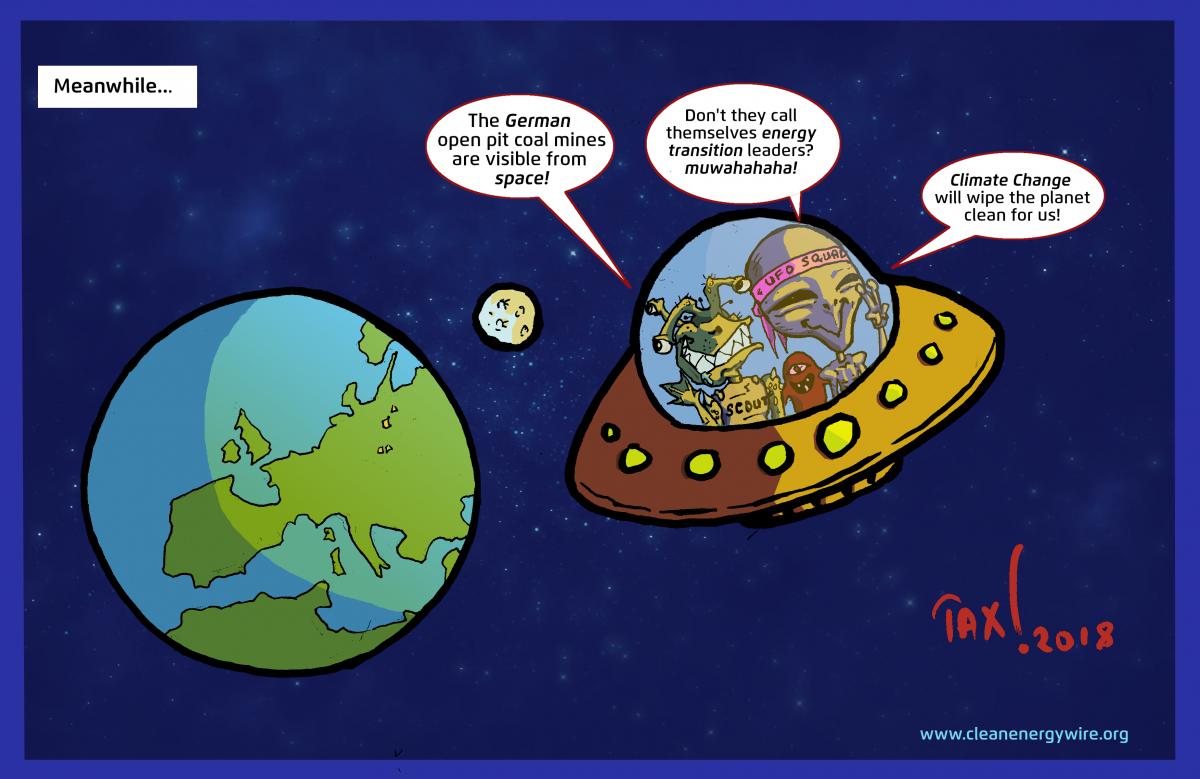Battery gigafactory deal forthcoming / Energiewende acceptance stable
Clean Energy Wire / dpa
Germany and China will use ongoing government talks to sign an agreement for the construction of a new battery-cell gigafactory in the state of Thuringia, a spokesperson from the state's economy ministry told the Clean Energy Wire. Chinese producer CATL plans to invest in a new factory in the east German state. Thuringia has the chance to "become one of the most important European locations for battery technology," Thuringia's economy minister Wolfgang Tiefensee had told news agency dpa. CATL and the state government will provide details on the investment at a press conference later today.
Find the article in German here.
Bundesamt für Naturschutz
A majority of 61 percent of the German population think the transition to an energy system dominated by renewables is the right way to go, 30 percent are undecided and 7 percent are opposed to the idea, the 2017 edition of the bi-annual survey on “nature awareness” conducted by the Federal Environmental Protection Agency (Bundesamt für Naturschutz) shows. The results were the same in 2015. In 2013 acceptance of the energy transition (Energiewende) was lower, at 56 percent.
Find the whole study in German here.
Find a CLEW factsheet on Energiewende surveys here.
RWI Essen
A survey of more than 7,500 German households in summer 2017 found that 84 percent approved of support for renewable energy and two thirds supported a coal exit, researchers from Rhineland-Westphalia Institute for Economic Research (RWI Essen) write. Support has remained high since a previous survey in 2016. However, a majority are unwilling to pay more for renewable power than electricity from conventional sources. Possible reasons for this could be that many households regard the transition to renewable power as too expensive and the distribution of costs unfair, the authors write.
Read the study in German here.
Find a CLEW factsheet on Energiewende surveys here.
Tagesspiegel Background
Transmission grid operator TenneT and the European Commission are proposing 1,300 megawatts of power trading capacity between Germany and Denmark, but consumer groups warn this will increase electricity costs for German households, Jacob Schlandt writes in Tagesspiegel Background. If more power from Denmark gets priority to be fed into the north German grid (which is already suffering from bottlenecks due to high wind-power input), costly countertrade, re-dispatch and feed-in management measures could result, Schlandt writes. According to Schlandt’s research, the European Commission has not examined these impacts and Germany’s Federal Network Agency has not been officially consulted.
Get the article (behind paywall) here.
Read a CLEW factsheet on the European dimension of Germany’s power grid here.
Spiegel Online
The federal council of state governments (Bundesrat) has urged the government to include the financial aspects of a coal exit in the so-called coal commission talks. The house voted by a small minority to include a separate cost analysis and concept on how assets could be reserved independently from the well-being of mine- and power plant operators, Stefan Schulz reports for Spiegel Online. The Bundesrat reasoned that such steps were necessary to avoid that the bill for renaturating and removal of coal-related interventions being footed by taxpayers.
Read the article in German here.
Read a CLEW factsheet on the workings of the coal commission here.
German Federal Government
Bavaria is the only German state that made use of a law to set its own minimum distance for wind turbines from residential buildings, the German government has said in an answer to a parliamentary inquiry by the Free Democrats (FDP). The government says there is no indication that a minimum distance leads to greater acceptance of wind power among citizens, and says the visibility of turbines and involvement of citizens in the planning stages play a much greater role. The government says the states’ general construction regulations and the German immission protection law (BImschG) are sufficient to ensure “reasonable” distances.
Find the inquiry in German here and the answer in German here.
See the CLEW factsheets Fighting windmills: when growth hits resistance and From survey to harvest: How to build a wind farm in Germany for more information.
Tagesspiegel Background
In a back-room deal, passages in the EU Renewable Energy Directive pertaining to self-consumption of power by small consumers were apparently changed at Germany’s urging, writes Tagesspiegel Background. On June 14, European Commissioner for Climate Action and Energy Miguel Arias Cañete tweeted that the EU had agreed on a target of 32 percent of renewable energy in final energy consumption by 2030. However, rules for self-generation and consumption of energy, an integral component of the 2030 target, have become increasingly unclear. According to Greenpeace’s Tara Conolly, Germany lobbied to make it harder for individual tenants to consume their own electricity. “Tenants are thus penalised compared to real-estate owners who live in their own homes and install a solar system. That is clearly discrimination,” she said.
You can purchase the Tagesspiegel Background article in German here.
For background, read the article Clear steps must underpin EU renewables goal – German energy minister.
German Federal Government
The EU emissions trading system (ETS) is not sufficient for ensuring that Germany meets either its CO2 emissions reduction goals or the other targets of its energy transition, the German government says in an answer to a parliamentary inquiry by the Left Party. “More specific and appropriate instruments are necessary to ensure a development in accordance with the medium- and long-term climate protection and Energiewende targets,” such as renewables expansion or higher energy efficiency, and to “guarantee planning security for everyone involved,” the government says. The government also says that a gap in reaching the 2020 effort-sharing emissions reduction goal of the EU “is to be expected.” It adds that buying emissions allowances from other EU states is a possibility and that the government will say whether Germany will make use of this option “in due course.”
Find the government answer in German here.
For background, read the factsheet Understanding the European Union’s Emissions Trading System.
Clean Energy Wire




